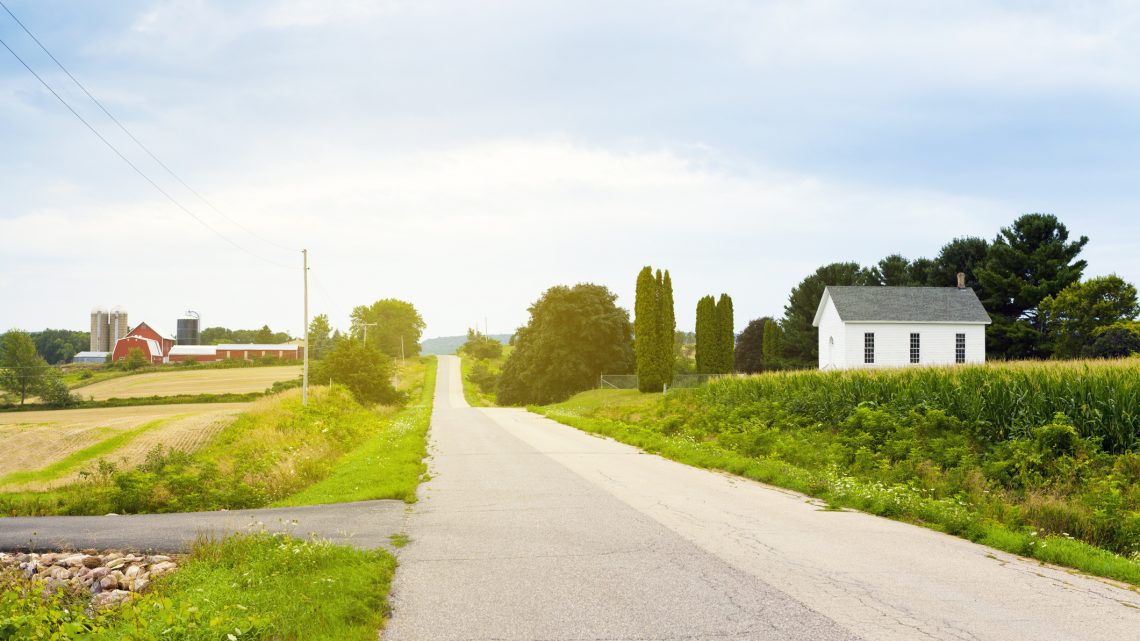Rockland, Wisconsin, sits along Interstate 90 about 30 miles from the Minnesota border. But there is no off-ramp to Rockland, as there is little reason for travelers to stop. Commercial Street divides the town in two, and along this street are the only businesses: a bank turned bar and grill, the Rockland Stop and Go gas station, and the US Postal Office. Between the 2000 and 2010 censuses, the town’s population actually fell from 628 to 594.
I pull my car into the Rockland Stop and Go and park next to one of the two gas pumps to refuel. The vintage look of the pumps only adds to the feeling of a town that moves at a slower pace. There are no billboards or stop lights, and the nearest grocery store is several miles away in a neighboring town. The reason I stop here is this was my home for the first 18 years of my life.
Of All the Growing Divides in America, None Is Sharper
Rural America has been in the news a lot due to recent politics. Many pieces have been written analyzing those who live in rural America – a class of politically “forgotten” who made their opinions known at the ballot box – or at least that is the story often reported. But there is an increasing separation between urban and rural. Victor Davis Hanson writes in LA Times, “Of all the growing divides in America, none is sharper than that between city and country.”1 This growing divide between rural and urban America is not only a political divide, it is also a growing religious divide.
Cities tend to change quickly – stores move in and go out of business, neighbors come and go, and there are constant modifications – but small towns like Rockland hold on to what they have, preserving their history and culture in a way large cities cannot. Damon Linker writes in THE WEEK, “Cities tend to be more dynamic, marked by rapid change, with the people who live there assuming that such changes make things better over time. The countryside, by contrast, is less dynamic, with changes happening more slowly, along with the assumption that changes often make things worse.”2 The last time I visited Rockland, little was different from when I moved away almost 10 years ago.
The cultural divide between urban and rural is difficult to ignore as you drive out of any Midwestern city into farm country. Cornfields replace parking lots and the horizon expands. But signs along the highway also show changing cultural views. Billboards for local restaurants are interspersed with anti-abortion ads and calls to repent from un-Christian behavior. These signs do show up occasionally in the city, but not with the same prevalence as in rural Midwest.
Rural Christians more commonly hold certain religious views that align with the political right. These include opposition to abortion, a belief that Christianity is under siege, a belief that Christians should “separate from the world” in a physical sense in addition to a metaphorical sense, and a focus on preserving church culture. A poll conducted by Washington Post-Kaiser Family Foundation found that “Nearly 6 in 10 people in rural areas say Christian values are under attack compared with just over half of suburbanites and fewer than half of urbanites.”3 In contrast, urban churches tend to be a lot more mixed in their views. Being politically liberal, including being pro-choice and pro-diversity in religion are looked on much more favorably.
We’re Alarmingly Content to Retreat into Cultural Bunkers
Hanson continues in his LA Times article by pointing out that the political concerns of rural residents are distinctly different than those of urbanites. “For rural residents, existential issues on the national level are seen as magnified versions of personal considerations: Does the country have enough food, fuel and minerals? Can America defend itself, protect its friends and punish its enemies? These concerns differ markedly from the urbanite’s worry about whether the government will provide services to take care of vulnerable populations or whether those of different races and religions can get along in such a crowded environment.”1
The concerns pointed out by Hanson are political, but mirror many of the religious arguments heard between rural and urban Christians. Questions such as, “Does the church have enough workers? How will the church defend itself against government overreach? And how does the church root out false teachings?” seem to be more common from a rural perspective. From an urban church-goer, questions such as “How does the church provide support for its community? What is done to root out bigotry? And what does the church do for mistreated populations such as LGBTQ+, immigrants, or homeless?” are more common.
This doesn’t mean urbanites don’t care about defending against government overreach or rural residents don’t care about helping the poor. It is more a reflection of the issues each side feels are not being properly addressed.
Certain issues also tend to be more visible to each side. Urbanites will likely come in contact with immigrants, homeless, and LGBTQ+ more often than rural residents. Rural residents, who on average are older than urbanites,4 will be more likely to feel the tides of cultural change and see certain longstanding church beliefs eroding.
This divide in perspectives fuels many church arguments. People do not feel like their opinions are respected, and therefore dig in deeper on whichever side they are fighting for. Stephen Backhouse says in Christianity Today, “We’re alarmingly content to retreat into cultural bunkers, adopting a scorched-earth, winner-take-all mentality and a violent attitude toward argument and disagreement. Debate becomes warfare, thinking becomes a weapon, and people with opposing ideas become enemies who must be dehumanized before they can be defeated. In such an atmosphere, changing one’s mind is an act of betrayal, and friendship with the opponent is treason.”5
Both sides are guilty of this trench warfare style of fighting without looking at what can be learned from the perspectives of the other side. While each party falls on opposite sides of many contentious debates, most never ask why the other believes the way he or she does with the genuine intent to comprehend the other’s perspective. Instead they take to Facebook or Twitter to ridicule the other’s beliefs behind the false veil of social media.
Being called to be an uncomfortable Christian means to talk to people who you disagree with, learn from their perspectives, and not attempt to convince them they are wrong. It means to visit churches that do not accept you – without planning to expose their hypocrisy. It means to not let your opinion be changed about the person sitting next to you simply by who they voted for in the last election.
The Obstacles May Seem Insurmountable
I don’t pretend to have an answer to such a complex problem – one that seems to divide both our church and our country. I do, however, believe it is a reconcilable problem. We are capable of learning to worship with people of opposing opinions and actually be friends with them. We must be friends with them, though, instead of begrudgingly tolerating their presence in our church.
We as Christians are not called to be comfortable. I don’t believe this means – at least for the majority of us – that we are supposed to sell our homes and move abroad. I believe being called to be an uncomfortable Christian means to talk to people who you disagree with, learn from their perspectives, and not attempt to convince them they are wrong. It means to visit churches that do not accept you – without planning to expose their hypocrisy. It means to not let your opinion be changed about the person sitting next to you simply by who they voted for in the last election.
As long as we continue isolating ourselves from each other physically, though, this separation will worsen. Christians on either side become scared of moving out of their comfortable location. Linker explains, “Uprooting oneself and one’s family is challenging enough. When it requires immersion and assimilation into what appears to be a profoundly hostile foreign culture, the obstacles can seem insurmountable.”2
More and more, urban and rural Christians are out of touch with one another. Rural Christians must acknowledge that urban Christians are necessary to advance a Christian message to the least of these and those alienated by severe legalism. But urban Christians must also acknowledge that rural Christians are necessary to preserve certain longstanding Christian structures and practices healthy for society and culture. Rural Christians have age and experience that some urban Christians don’t. History is an invaluable tool for preparing for the future. If we disregard the opinions of those who experienced history, we will make the same mistakes again.
In our enthusiasm to change, we build highways in our church that speed past small towns like Rockland, Wisconsin. We leave disconnected two parts of our church that desperately need each other to survive. Instead of rural and urban Christians looking to each other for context and learning, each side contents itself to look at the other like a foreign country – or in many cases – a different religion.
—
- Hanson, Victor David. “How the Widening Urban-Rural Divide Threatens America.” LA Times. www.latimes.com.
- Linker, Damon. “It’s Not an Elite vs. Populists. It’s Cities vs. the Countryside.” THE WEEK. www.theweek.com.
- Delreal, Jose and Scott Clement. “New Poll of Rural Americans Shows Deep Cultural Divide with Urban Centers.” The Denver Post. www.denverpost.com.
- “Urban-Rural Divide Growing Deeper throughout US.” NBC News. www.nbcnews.com.
- Backhouse, Stephen. “Hating Your Neighbor Will Make You Dumb.” Christianity Today. October 2017.










